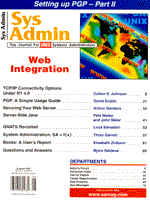
Editor's Forum
"Doin' the Web Wait" is not a new dance craze sweeping the nation. It is also not the act of strumming your fingers on your desktop until your ISP's server decides to service your browser's latest request, initiated by your last, seemingly simple, mouse click. Rather, "Doin' the Web Wait" is an even longer process than waiting for some overloaded server somewhere (who cares where?) on the Internet. It is how I describe the process of waiting for the Web's infrastructure of applications to fill in. Few would argue that the Web has not significantly changed the way we perform many computer-related activities. In fact, many suggest that the Web is fundamentally changing the way we live and do business. Just how fundamental that change will actually be, however, is yet to be seen. While it is certainly possible for all computer-based activities to shift to a Web-based paradigm, we are not there yet. Whether we get there will be determined both by the quality and robustness of the applets and helpers, Java-based and otherwise, that are in the development pipeline, and by the business public's acceptance of yet another shift in computing paradigms. It is unclear whether above-average business users, once dubbed power users, will accept a browser as the foundation for all of their computer-based work. Will they, for example, be willing to give up the feature-rich capabilities of their favorite word processing application for a stripped-down applet version? Perhaps. Will they give up the current ability to choose from a wide variety of applications, each suited to a particular task and running independently within the user space provided by their favorite operating system? Unlikely, notwithstanding the benefit of potentially greater data portability between Web-based applets. On the other hand, will a data entry clerk accept the graphical environment of a Web-based data entry application, running on a Network Computer (NC) in lieu of their current application running on a character-based terminal? Probably, but still unclear. These folks, after all, have a much better understanding of keystrokes than the rest of us. As such, this segment of the user populace will likely demand a working environment that is at least as efficient as their current one, particularly if they are paid on the basis of transactions entered. Although a Web-based front end has the distinct advantage of not requiring a rewrite of the underlying database application (a factor that has dissuaded many businesses from embracing a fully client-server model of computing), the quality, robustness, and efficiency of the applet will determine its acceptance by users. Thus, as system administrators charged with the responsibility of providing and maintaining our organization's computing infrastructure, we do the Web Wait. We wait for the promised plethora of Java-based applets to arrive. We wait to see how functional these applets are and how robust. We wait for our users to embrace or reject the new way of doing their jobs. And, we wait for security experts to find the weak spots in the new fabric of computing that might allow some 15-year-old hacker in Amsterdam to turn our corporate riches into rags. Notwithstanding the bold pronouncements of industry luminaries, we are, after all, just doin' the Web Wait.
Sincerely yours,
|